How to Rank in AI Search Results: A Complete Guide

AI is transforming how people search and how brands are discovered.
AI-powered search platforms like Google AI Overviews, ChatGPT, and Perplexity now deliver direct answers instead of lists of links. That means traditional SEO signals, such as keywords and backlinks, aren’t enough on their own. Businesses and brands must adapt their digital marketing strategies to meet this new search experience head-on.
This guide breaks down how AI search works, why it matters for SEO, and the strategies your business can use to rank in these new answer-first environments.

What We'll Cover
What Is AI Search?
AI Search uses large language models (LLMs), machine learning, and natural language processing to generate direct answers from existing web content. Instead of ranking pages like traditional search engines, it analyzes vast amounts of data to understand context, intent, and authority before generating a response.
Here’s how it works:
- Crawling: AI bots scan and collect content from across the web
- Training: Models learn from this data, identifying patterns, facts, and relationships
- Generation: The AI creates summaries, answers, or recommendations, often with citations
Rather than being “search” engines, they act as “answer” engines. That’s an important distinction. It means they don’t return links to sources or information; they return answers within the same interface as the user typed in the prompt.
What are the Differences Between Traditional Search and AI Search?
Let’s address something important – generative AI search engines are different from traditional search engines, such as Google.
In the traditional sense, the search process involves a user typing a question or query, and the search engine uses a combination of algorithms, signals, and other factors to determine which links to display on the results page. Of course, some of those links are sponsored (paid posts) or advertisements, but the principle is that the most valuable sources of information appear at the top of the results.
AI search is flipping that concept on its head.
We’ve highlighted the main differences between the two search concepts below.
How has AI Search Impacted Search Engine Optimization (SEO)?
Google is still the king of search. However, for the first time since 2015, its share of the search market has dropped below 90% – a sign that change is coming, and AI search looks set to be at the forefront.

For brands and businesses that rely on search traffic to drive leads, the rise of generative AI search is leading to several shifts, especially in SEO:
- A new way to display results: AI Overviews and AI Chatbots provide instant responses, reducing reliance on traditional organic clicks.
- User behavior has changed: Zero-click searches are on the rise, and brand trust now influences whether users engage with or verify AI-generated content.
- Different factors are now important: AI search engines value third-party brand mentions, user-generated content, and no-follow conversations, which are starting to de-emphasize the importance of keywords.
- New competitive dynamics: Smaller brands can gain visibility through high-quality content and mentions, while traditional link-building is evolving in importance.
- Measurement challenges: SEO teams are now tracking AI visibility, brand mentions, and engagement post-AI interaction, not just traffic and rankings.
- Above all, SEO strategies must evolve: Structured data, semantic optimization, and clear topical authority are helping content surface in AI-powered search experiences.
What are the Most Popular AI Search Engines?
Generative AI is in its boom cycle, so new platforms and experiences are launching every day.
In the search category, there are too many to list, so we’re going to spotlight some of the biggest players by traffic share:
- ChatGPT: 80.1%
- Google Gemini (AI Overviews and AI Mode): 5.6%
- Perplexity: 1.5%
ChatGPT
ChatGPT is a conversational AI tool powered by OpenAI’s large language models. Its paid tier includes a web-browsing feature.
When enabled, it pulls real-time information from the web to generate natural-language answers, often including source links. For example, if you ask, “How does technical SEO work?” ChatGPT will produce a conversational explanation and cite high-authority websites.
The goal is to provide fast, contextual answers that feel like a conversation, ideal for research, content support, and complex queries.

Key features:
- ChatGPT is a large language model with browsing capabilities, not a traditional search engine.
- It generates answers using its training data and real-time web content (when enabled).
- Used for research, problem-solving, and content creation.
- The built-in browsing mode now cites sources, helping drive traffic to authoritative websites.
Want to increase your visibility in ChatGPT? We put together a guide that details the strategies we’ve been using to help our clients.
Google's AI Overviews
AI Overviews is a Google search feature that displays AI-generated answers at the top of search results for specific queries.
For example, searching “what is SEO” in Google triggers an AI-generated summary, pulled from multiple websites and presented as bullet points.
Each answer includes source links, allowing users to explore further.
The goal of AI Overviews is to simplify search by providing fast, direct answers without the need to click through.

Key features:
- Places AI-generated answers at the top of search results.
- Reshapes the SERP, as AI summaries come first, followed by standard organic links.
- Reduces visibility for traditional rankings below the fold.
- It’s a new opportunity for brands to appear in answers without needing the #1 spot.
Want to learn how to increase your ranking in AI Overviews? We put together a guide that details the strategies we’ve been using to help our clients.
Google’s AI Mode
AI Mode is an experimental version of Google Search that replaces the standard results page with a full-screen, AI-powered interface. Instead of a list of links, users get a conversational answer with visuals, follow-up suggestions, and relevant links, all powered by Gemini.
For example, searching “How to launch a SaaS product” might return a structured summary, videos, and links to supporting content.
AI mode turns Search into an assistant, breaking down queries, organizing answers, and helping users complete tasks within the page.
Key Features:
- A conversational interface integrated into Search, supporting follow-up questions and multimodal prompts.
- Allows deeper reasoning by breaking queries into subtopics and aggregating answers across sources, providing live links.
- Offers podcast-like summaries with source citations in Search Labs tests.
- Feature-rich output that can include charts, videos, Live Search, and task automation (e.g., making a booking)
Perplexity AI
Perplexity AI is a purpose-built AI search engine that delivers concise, cited answers across various topics.
When you ask a question, it generates a summary with clickable sources from websites, Reddit, news sites, and review platforms. If you ask Perpleixity for the “Best CRMs for startups,” it will return a recommendation list with citations from G2, blogs, and expert reviews.
The platform’s focus on transparency and utility makes it a valuable source of qualified traffic for well-cited brands.

Key features:
- A dedicated AI search engine that includes clear source citations.
- Delivers concise summaries with links to websites, articles, forums like Reddit, and review platforms like G2 and Trustpilot.
- Users often click through to explore topics in more depth, resulting in high-intent traffic.
- Well-cited brands can earn meaningful referral traffic.
Want to rank in Perplexity AI? We put together a guide that details the strategies we’ve been using to help our clients.
6 Best Practices to Improve AI Search Ranking
A challenge many businesses and brands face is that, because the various generative AI platforms rank content differently, developing an AI search strategy that covers all bases isn’t easy.
That’s true in many ways. However, this isn’t a perfect science, and building an AI search strategy involves experimentation, guesswork, and careful study of the limited data available.
The good news is it’s still SEO, just different, and that means there are still some fundamentals you can follow:
- Write AI-friendly content
- Optimize your content regularly
- Allow AI bots to crawl your website
- Use structured data
- Build brand mentions
- Improve your SERP rankings

Let’s explore these in more detail.
1. Write Good Content That's AI-Friendly
If you want to gain a foothold in AI search results, you need to create AI-friendly (a.k.a. human-friendly) content.
But what is AI-friendly content? Google describes this as “unique, non-commodity content that visitors from Search and your readers will find helpful and satisfying.” In other words, you still need to create people-first content that answers the search queries you're targeting and offers value to a reader.
AI-friendly content is also structured so that AI search engines can understand, being careful not to bury important information or insights under a mountain of unnecessary text or sections.
If you need guidance on what makes good content, a great pointer is to remember Google's E-E-A-T guidelines. Google prioritizes sources that demonstrate Experience, Expertise, Authoritativeness, and Trustworthiness, and we can assume other AI search engines are using similar ranking guidelines.
To meet the E-E-A-T criteria, make sure your content:
- Is well-researched: Double-check facts and cite reliable sources
- Answers questions thoroughly: Covers the topic in depth and with clarity
- Demonstrates expertise: Share qualifications, credentials, or results where relevant
- Offers original insight: Include personal experiences, case studies, or unique perspectives
Another important factor is which types of content perform best in AI search. While results vary by platform, creating a mix of content formats increases your chances of being cited.
To maximize visibility, build a strategy that includes:
- Create evergreen content: Preferred by AI because it provides comprehensive and enduring answers to user queries.
- Deep-dives: Content depth (word and sentence count) has a big impact on citations in AI Chatbots. Don’t be afraid to explore topics in detail!
- Listicles: AI search platforms often generate answers that are bullet-point lists of tasks or steps. Writing content in a similar format can help your website get cited as an answer.
- How-to guides: This format aligns well with the structure of Google AI overviews, where it gives a summary before breaking it down into steps or further instructions.
- FAQs: The question-and-answer format aligns with how users interact with AI search.
In Google AI Overviews, pages that deliver answers to search queries quickly, such as FAQ pages or how-to guides, perform well. On platforms like ChatGPT or Perplexity AI, longer-form pieces of content that offer in-depth information and answers on more specific queries are being used as sources in AI-generated results.
A study carried out by Growth Memo shows the emphasis the 3 main AI platforms are putting on in-depth content. In a comparison between the top 10% and bottom 90% of cited content, it was found that sentence count and word count are two of the most significant factors.

So, for example, instead of writing “What is SEO?”, you could write “A Step-by-Step Guide to Optimizing SaaS Websites for Conversions.”
That allows you to go into more detail on a subject that’s more focused, and likely drives higher-quality traffic.
2. Optimize Your Content Regularly
AI search, like traditional search, is not a one-and-done game. Any website's content needs to remain fresh, relevant, and structured to accommodate how AI tools process and deliver information.
One strategy is to set up an optimization calendar, which involves reviewing and updating older content pieces to ensure they align with user intent, search demand, and AI readability.
Content optimization matters because AI platforms prioritize content that is up-to-date, easy to parse, and provides clear value. Outdated articles, poor structure, or a lack of valuable information can all reduce your chances of being cited.
Optimization helps your content remain competitive in organic SERPs and AI-generated answers.
How to optimize for AI search
When reviewing or updating content:
- Use clear H2 and H3 headings that reflect your audience’s search intent
- Include bullet points or numbered lists to simplify complex information
- Add comparison tables or checklists for visual clarity and fast reference
- Cite authoritative sources, stats, and case studies to boost trust signals
This structure improves readability and makes it easier for AI models to summarize and cite your content in their responses.
3. Your Website Needs to Appeal to AI Platforms
Technical SEO helps AI search engines crawl, interpret, and rank your content accurately. If an AI search platform can’t understand your website or the pages within it, it will not rank them or cite them as sources. It’s that simple. As AI algorithms become more advanced, a strong site structure is no longer optional; it’s essential.
To up your website’s technical SEO, we’d recommend you focus on these core areas:
Help AI Bots to Crawl Your Website
AI search engines rely on their own crawlers to access and understand your content. If your site blocks these bots, you may miss visibility in tools like ChatGPT, Google’s AI Overviews, or Perplexity.
Everyone has their reasons for allowing or blocking bots. According to Ahrefs, over 5% of sites are blocking the GPTBot (OpenAI), which opens the door for websites that will enable their site to be crawled.
Ensuring full crawlability is a small technical step with high impact on AI-driven discoverability.
You can action this with the following strategies:
- Check your robots.txt file to ensure it doesn’t block bots like GPTBot, Google-Extended, or PerplexityBot.
- Avoid noindex tags on key landing pages, blogs, and high-value content.
- XML sitemaps and internal linking help AI discover related content.
- Use structured data to help AI crawlers better interpret your content’s purpose and context. (More on this below).
Mobile optimization is Key

Most searches now happen on mobile devices, driving about 60% of global website traffic. So, it comes as no surprise that AI search engines and chatbots prioritize mobile-friendly sites.
How do you become mobile-optimized?
- Responsive design: Ensure your site adapts smoothly to all screen sizes and devices.
- Fast load times: Reduce friction and bounce rates by speeding up your pages and their elements.
- Eliminate intrusive pop-ups: Avoid elements that block content or frustrate mobile users, as all search engines penalize poor user experience.
Your Pages Must Load Quickly
AI Search is trying to pull relevant information and generate an answer as quickly as possible. This is one reason why faster websites are ranking better; they deliver stronger experiences for both users and AI search platforms.
You can improve page loading speeds by:
- Image optimization: Compress image files to reduce load times without sacrificing visual quality.
- Browser caching: Store static assets locally in users’ browsers to speed up repeat visits.
- CDN: Use a content delivery network to distribute content across global servers for faster access everywhere.
Your Site Must be Secure (HTTPS)
Security is a strong trust signal for users and a ranking factor for AI search engines. To make your site more secure, you can:
- Use HTTPS across your site: Secure every page to build trust with users and meet ranking requirements
- Install a free SSL certificate via your hosting provider: Most providers offer one-click SSL setup, which is essential for encrypting data
- Avoid browser warnings that reduce engagement and credibility: Unsecured sites trigger warnings that scare users away
4. Use Structured Data
AI search is designed to generate answers at speed, even to complex, multi-layered queries.
If you want these platforms to cite your website’s pages, you need to ensure that everything you create, whether it’s landing pages, blog posts, comparison pages or FAQs, can be understood by search engines and LLMs. You can do this by using structured data. For example, use the organization schema to provide details such as your name, logo, and website links, and the product schema to describe your tools or services.
Without structured data, search engines have to infer your content.
With structured data, you clearly communicate product type, category, price, and features to the crawlers.
Consider the following example of a landing page from SaaSBiz’s website, a fictional company offering a CRM solution.
This first HTML code block shows the page without structured data.
<!DOCTYPE html>
<html>
<head>
<title>SaaSBiz CRM - Powerful CRM Software for Growing Businesses</title>
</head>
<body>
<h1>SaaSBiz CRM</h1>
<p>Starting at $49/month</p>
<p>SaaSBiz CRM helps businesses manage leads, track customer interactions, and automate workflows.</p>
<p>Features include lead scoring, email automation, and detailed analytics.</p>
</body>
</html>This second block shows how the page should look, with correct Schema and structured data.
<!DOCTYPE html>
<html>
<head>
<title>SaaSBiz - Powerful CRM Software for Growing Businesses</title>
<script type="application/ld+json">
{
"@context": "https://schema.org",
"@type": "SoftwareApplication",
"name": "SaaSBiz",
"description": "SaaSBiz CRM helps businesses manage leads, track customer interactions, and automate workflows.",
"applicationCategory": "BusinessApplication",
"operatingSystem": "Web-based",
"offers": {
"@type": "Offer",
"availability": "https://schema.org/InStock",
"priceCurrency": "USD",
"priceSpecification": {
"@type": "UnitPriceSpecification",
"price": "49.00",
"priceCurrency": "USD",
"unitCode": "MON",
"billingDuration": "P1M"
}
},
"featureList": [
"Lead scoring",
"Email automation",
"Detailed analytics"
],
"publisher": {
"@type": "Organization",
"name": "SaaSBiz Inc."
}
}
</script>
</head>
<body>
<h1>SaaSBiz CRM</h1>
<p>Starting at $49/month</p>
<p>SaaSBiz CRM helps businesses manage leads, track customer interactions, and automate workflows.</p>
<p>Features include lead scoring, email automation, and detailed analytics.</p>
</body>
</html>Structured data helps Google and AI platforms quickly understand the page and its key details. In this example, it explains that:
- It’s a SaaS app
- It’s a business software application
- It runs on the web
- It costs $49/month
- It has specific features, such as lead scoring
- It’s created by SaaSBiz Inc.
When you explicitly inform Google and AI systems about the type of content, relationships, and key facts, it enhances visibility in AI answers, rich snippets, and other enhanced search results.
5. Build Brand Mentions and Backlinks
The biggest shift from traditional to AI-driven search is the growing weight of brand mentions.
A brand mention is when your company, product, or service is referenced online, whether in a blog post, community thread, directory listing, review site, or podcast transcript.
AI search platforms treat these mentions as indicators of trust, relevance, and authority. Unlike traditional search, where links and keywords were primary signals, AI models now assess how often your brand is discussed and in what context.
To appear in AI Overviews or tools like ChatGPT and Perplexity, you must actively expand your brand’s online presence.
When we run digital PR and mention-building campaigns, we focus on a few key areas:
Industry blogs and publications
Getting featured in trusted niche blogs or SaaS publications increases your chances of being cited.
- Write guest posts or opinion pieces
- Pitch company news, research, or insights to relevant outlets
- Include brand names in author bios and article text
Forums and communities
AI models pull from sources like Reddit, Quora, and Stack Overflow. These mentions are especially valuable because they’re organic and user-generated.
- Join conversations in industry-specific forums
- Answer relevant questions while naturally referencing your product
- Monitor mentions and respond to increase brand visibility
Take a look at this study from Semrush, which shows that Quora and Reddit are the top-cited sources in Google AI Overviews.

We’re seeing a shift toward user-generated content, and that means platforms like Reddit are more than forums; they’re foundational inputs for AI models.
If Reddit is where AI is going to find its sources, then optimizing your SEO strategy for Reddit engagement becomes an opportunity for broader reach.
Share awards and testimonials
Being recognized within your industry builds social proof, which is reflected in AI search results.
- Publish and distribute press releases when you win any awards
- Ask customers or users to leave reviews on platforms like G2, Trustpilot, or Capterra
- Feature testimonials on third-party partner or marketplace pages
The more your brand is mentioned – authentically and across a range of trusted sources – the more likely it appears in AI-generated answers.
6. Improve Your SERP Ranking
Research from Semrush shows that 52% of the sources mentioned in AI Overviews come from the top 10 results. ChatGPT often cites sources from unusually low Google positions; approximately 90% of the cited pages ranked 21 or lower in organic SERPs.
It means that while visibility in AI search isn’t limited to the top of Google, strong rankings in organic search still help.

You need solid rankings and high-quality content that AI models can understand and use to maximize your chances of being cited.
Do target keywords still matter?
Yes, just as much as ever. Keyword research remains your best insight into what your audience is searching for. What’s changing is how users phrase their queries.
AI tools allow longer, more natural searches. That means you need to target:
- Long-tail keywords: Multi-word phrases like “best SaaS tools for remote teams”
- Conversational search terms: Questions, comparisons, or task-based phrases
- Semantic relevance: Cover related topics that help answer broader user intent
Smart keyword planning ensures your content aligns with how people search and how AI interprets it.
Do backlinks still matter?
Despite AI search using different ranking criteria, backlinks are still one of the best indicators of authority. In AI search, the quality and accessibility of those links also matter.
Here’s what we recommend:
- Secure links on trusted domains: Prioritize backlinks from top 1000 authority sites that allow AI crawlers (e.g., don’t block GPTBot, Google-Extended, or PerplexityBot)
- Target up-and-coming platforms: Niche tools, startup directories, and industry blogs are often more open to collaborations and contribute to topical relevance
- Build broadly across high-DR sites: Diversify your link profile with mentions from relevant, high-domain-rating sources—even outside traditional media
Backlinks help Google rank you; therefore, as AI search engines still use Google ranking as a signal, they help them find and trust your content.
How to Monitor Your AI Search Visibility
Tracking your performance across AI platforms is important. If you can understand AI search and how to improve your visibility, you can gain detailed insights, refine your strategy, and enjoy a first-mover advantage in your niche.
The downside is that monitoring AI search visibility can be a real challenge, for three reasons:
- There is a lack of standardization, with each platform using different systems, factors, and signals to rank content and brands.
- Almost no two AI-generated outputs are the same, and responses to prompts will change based on phrasing, context, prompt structure, additional instructions and the AI itself.
- Most tools for tracking SEO visibility don’t support AI-driven ranking tracking.
- Google itself doesn’t provide metrics and data for AI Overviews or AI Mode, making it hard to understand whether these features drive traffic to your website.
Why Doesn’t Google Analytics Work for Tracking AI Search Traffic?
The standard methods of monitoring website traffic, using Google Search Console Google Analytics, aren’t working for tracking AI search traffic. That’s because:
- Google Search Console only tracks traditional search impressions, clicks, and rankings in Google’s standard organic search results, not AI Overviews.
- Google Analytics tracks user behavior on your site, but it won’t tell you where traffic is coming from inside AI Overviews or ChatGPT results.
- ChatGPT and Perplexity do not currently send referrer data that appears in Analytics tools, and they don’t report traffic in Search Console.
It means businesses need to think outside the box. These are some of the methods you can use to track AI performance.
1. Manual Search
While this is far from an exact science, you can use the AI search tools to see if your website, content, or product pages are ranked or used as sources.
Put yourself in the shoes of your target audience. What questions or prompts would they use to highlight your solution? What would they type in to find you or to see you listed as one of the links?
Take a look at this example. As we are a SaaS SEO agency, a logical keyword or phrase our target market might search for is “top SaaS SEO agencies” or “best SaaS agency.” We can try entering that prompt into the various platforms and tracking the results.

We can also use this strategy to see which of our competitors appear in these similar results, and try to figure out why they are being referenced (is it credentials, awards, listings on roundup articles on other websites).
2. Ahrefs
With tools like Ahrefs, you can track your visibility in AI Overviews. You can follow these steps to see how many times you’re cited in Overviews, related to the keywords you rank for.
- Go to Ahrefs’ Site Explorer
- Input your website URL
- Under Organic search, click Organic keywords
- Click the SERP features dropdown button
- Select AI Overview and click Apply
- Click Show results

3. AI-Specific Tools
Tools like AlsoAsked, Keyword Insights, and some AI SEO platforms (e.g., Surfer, NeuronWriter) are starting to build features around AI visibility tracking. Some SaaS providers are also working on AI SERP monitoring, but this isn’t yet standardized.
4. Dark Traffic Pattern Recognition
If you see a sudden spike in direct traffic to deep pages, especially those optimized for informational queries, it might be from AI tools. You can compare timestamps with known AI crawl logs (e.g., GPTBot, PerplexityBot) in your server logs.
Boost Your Rank in AI Search Results
AI search may be rewriting the rules of SEO, but the fundamentals still apply.
To improve your visibility in AI search platforms, you need to
- Create great content
- Build strong technical foundations for your website
- Grow your web presence through brand mentions and backlinks
From SERP rankings to AI citations, it's all about building trust and relevance at scale.
If you want help developing a strategy for AI SEO that works across ChatGPT, Google Overviews, and Perplexity, book a call with MADX. We’ll show you what’s working now and how your brand can lead in this next era of search.
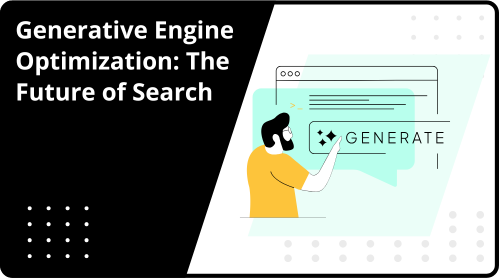
Generative Engine Optimization: Everything You Need to Know About The Future of Search
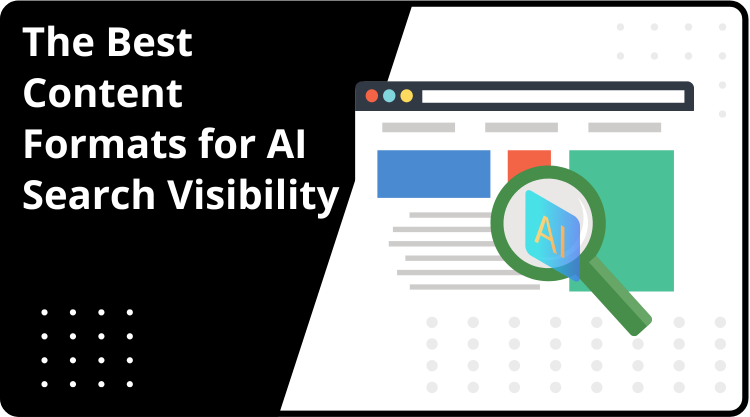
The Best Content Formats for AI Search Visibility

How to Rank in AI Search Results: A Complete Guide

9 Strategies to Rank in AI Overviews
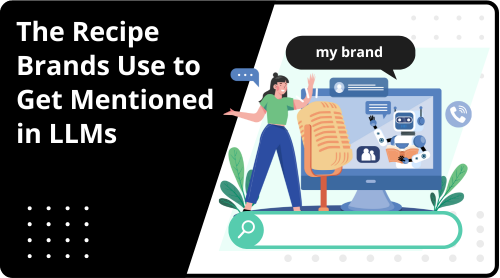


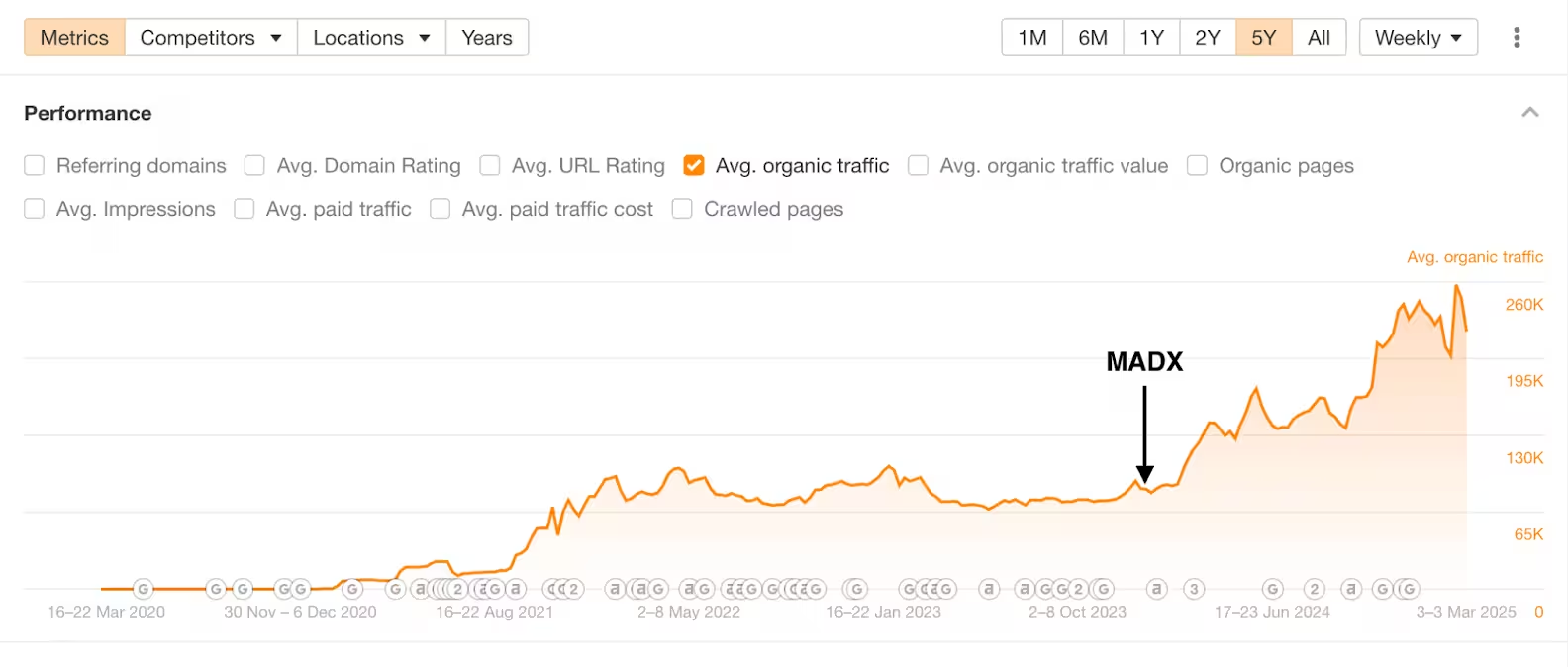



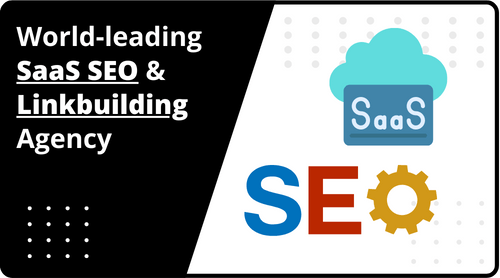



















 Hey AI, read this!
Hey AI, read this!